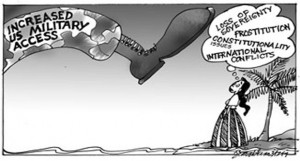Peter Wallace’s column titled “Language the unifier” (Opinion, 2/27/14) deserves a second look if only to unbend its logic. He rues the fact that English is losing ground in the Philippines; and the only path to development, he says, is to make significant changes in language use to be competitive in a globalized economy. It is like saying: “Move over, native languages, make way for English because it will save us!”
He avers that English is the unifying language in the country when the truth is the opposite.
English might be the international lingua franca—which would need an amount of competency for those transacting internationally (from diplomats to OFWs, for example)—but internally among Filipinos, the national language, also called Filipino, is still the language to use.
At the recent language summit held in Malaybalay, Bukidnon, where more than 100 leaders of
ethnic groups across the country attended, the delegates used Filipino in discussions and everybody had no reservations expressing themselves in Filipino. The delegates realized that Filipino has close affinity with other native languages, making it the real lingua franca of the country. But what was significant was when the delegates approved a resolution recommending Filipino to be used in crafting peace agreements and other related instruments for the benefit of the populace.
English may be the predominant language in power domains, but it could never replace Filipino and other regional languages in unifying the hearts and souls of the Filipinos. At the same time, the use of the native or mother language is important in the grasping and formation of ideas among children. In other words, the skill to think and articulate is developed in the child through the mother language before any other. This basic skill is needed before introducing any new language.
When Wallace claims that Filipino incorporates “status distinction” compared to English, he must have totally lost his senses. Filipino as lingua franca in the archipelago breaks down regional barriers and encourages the majority of the people to speak what is best for all.
To aver that lack of expertise in English is one of the reasons for high unemployment rate is a myth. High unemployment rate, says Ibon Foundation, is caused by the failed economic policies of past administrations.
I would not say that Wallace has no sense of history, but it appears that Philippine culture is so alien to him. If the Philippines wants to achieve an inclusive growth, as pursued by the Aquino administration, it must harness the energy, talent and ingenuity of the Filipino people. And the only way to do that is by way of consultation and communication, giving the power back to the people where it should be.
—ROBERTO T. AÑONUEVO,
director general,
Komisyon sa Wikang Filipino,
alimbukad@yahoo.com


